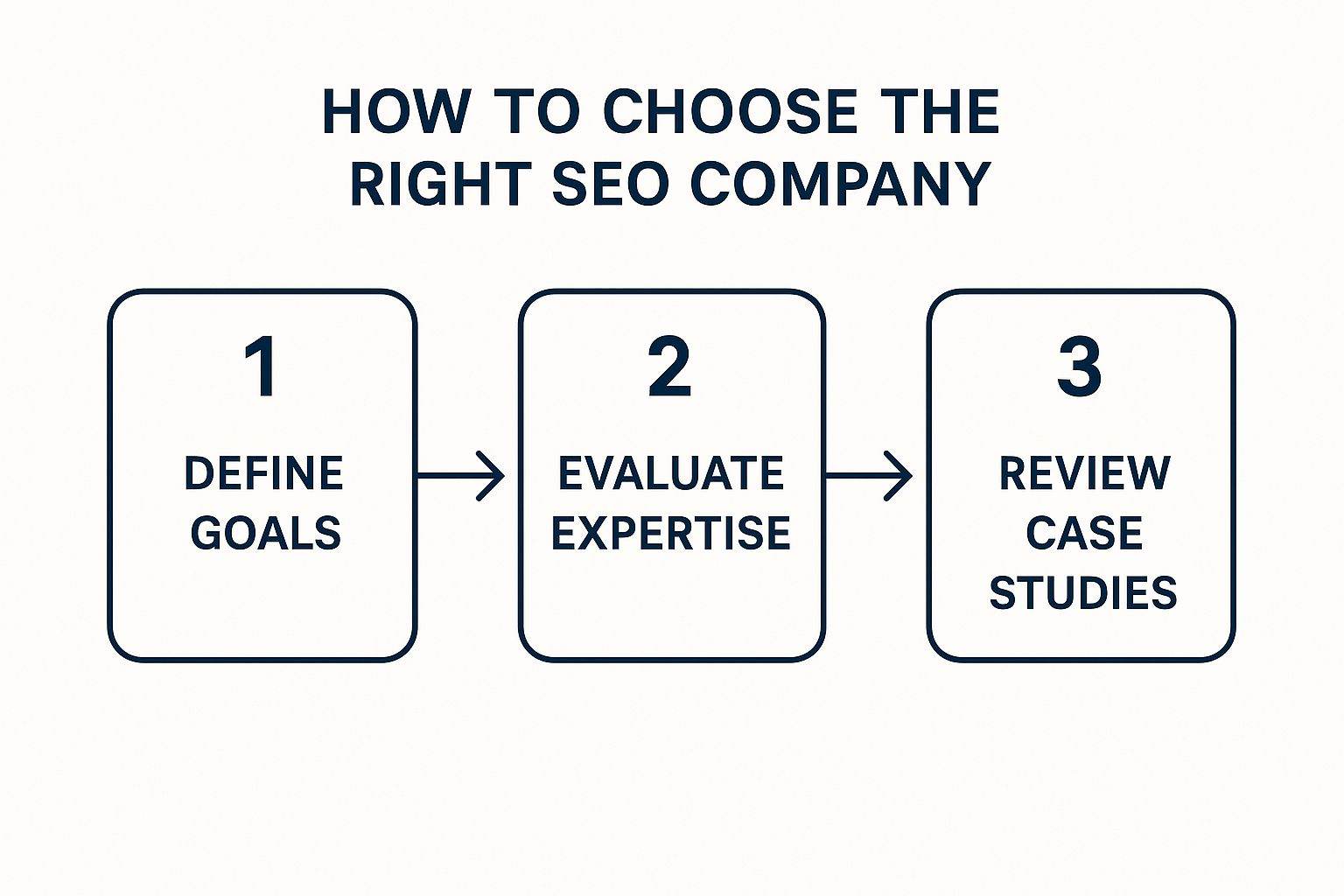A search engine optimization company, at its core, is an agency that helps your website show up more often and more prominently in search results on platforms like Google. The main goal is to drive up your organic traffic—that is, visitors who find your website on their own, without you paying for an ad.
Think of them as the expert marketing and construction crew for your digital storefront.
What a Search Engine optimization company Actually Does
So, what’s really going on behind the curtain? Let’s cut through the jargon. Imagine you’ve built the most incredible shop, stocked with fantastic products, but it’s tucked away on a forgotten side street. An SEO company is the team that builds a brightly lit, four-lane highway straight to your front door and puts up massive, can’t-miss-it billboards along the way.
Their work isn’t about some secret handshake or gaming the system. It’s a methodical process of figuring out where you stand online, spotting opportunities your competitors have completely overlooked, and building a long-term plan to keep you visible. This means they get to know your business, your audience, and your competition inside and out.
The Strategic Foundation
Before a single line of code is touched or a word of content is written, a good agency starts with discovery. This first step is everything. It sets the course for the entire campaign. It’s like a doctor running diagnostics before writing a prescription; without knowing what’s actually wrong, any “solution” is just a shot in the dark.
This foundational work usually involves:
- Understanding Your Business Goals: What does success look like for you? Is it getting more phone calls, selling more products online, or becoming the go-to name in your industry?
- Audience Deep Dive: Figuring out who your ideal customers are. What keeps them up at night? What words do they type into Google when they’re looking for answers?
- Competitive Reconnaissance: A thorough look at what your main competitors are doing right and, more importantly, where their blind spots are.
- Technical Health Check: A full audit of your website to make sure search engines can find, crawl, and understand your pages without any technical roadblocks.
One of the biggest myths about SEO is that it’s a “set it and forget it” task. The reality? It’s a marathon, not a sprint. It demands constant tweaking, analysis, and adaptation to keep up with an ever-changing digital world.
From Analysis to Action
Once all that homework is done, the SEO company turns those insights into a clear, actionable plan. They’ll create a roadmap detailing what needs to be done, when it will happen, and how success will be measured. This is what separates a real growth strategy from a bunch of random tactics.
The sheer momentum in this field is telling. For example, the SEO software market in the United Arab Emirates pulled in around USD 1.2 billion in 2024 and is on track to hit USD 2.4 billion by 2030. This kind of investment shows just how vital SEO has become for any business that wants to stay competitive. You can dive deeper into the UAE’s SEO market growth on Grand View Research.
Ultimately, an SEO company is your partner in growth. They’re the ones building the digital pathways that connect you with people actively looking for what you offer, turning that hidden gem of a store into a landmark destination.
Understanding What Top SEO Agencies Actually Do

Not all services from a search engine optimisation company are created equal. To figure out what you actually need, you have to understand the core parts of any solid SEO strategy. These are often called the “three pillars of SEO,” and they all have to work together to build a real online presence.
The best way to think about it is to imagine your website is a brand-new house. For it to be valuable, functional, and popular, it needs a strong foundation, well-designed rooms, and a great reputation in the neighborhood. These three elements map directly onto the pillars of SEO, giving you a complete framework for growth.
Technical SEO: The Foundation of Your Digital House
This is the bedrock of your entire strategy. Technical SEO is all the behind-the-scenes work that makes your website easy for search engines like Google to crawl, understand, and index. If this foundation is cracked, everything you build on top of it is going to be wobbly.
Think of it this way: if your house has blocked doorways, confusing hallways, and no address on the front, visitors—including search engine “spiders”—will get lost and just give up. A skilled SEO agency ensures your site has a clean structure, loads lightning-fast, and has a clear sitemap. Without this, even the most incredible content might never get seen.
To get a clearer picture, here’s a quick breakdown of what a search engine optimisation company actually does in each area.
Key Services of a Search Engine Optimisation Company
| Service Category | Description | Primary Business Goal |
|---|---|---|
| Technical SEO | Optimizing the website’s backend and server-side elements to ensure search engines can crawl and index the site effectively. This includes site speed, mobile-friendliness, and security. | Improve search engine visibility and user experience by creating a technically sound website. |
| On-Page SEO | Creating and optimizing content on individual web pages to rank higher and earn more relevant traffic. This involves keyword research, content creation, and HTML tag optimization. | Increase organic traffic and conversions by directly answering user search queries with high-quality content. |
| Off-Page SEO | Building the website’s authority and reputation through external signals, primarily by earning backlinks from other reputable websites. | Establish trust and authority with search engines, leading to higher rankings and brand credibility. |
| Local SEO | Focusing on improving visibility in local search results for businesses with physical locations or service areas. This includes optimizing Google Business Profile and local citations. | Drive foot traffic and local online leads by appearing in “near me” searches and on local maps. |
| Content Marketing | Developing a strategy to create and distribute valuable, relevant content (blogs, articles, videos) to attract and retain a clearly defined audience. | Build brand awareness, engage potential customers, and generate natural backlinks. |
| Analytics & Reporting | Tracking, measuring, and analyzing SEO performance data to refine strategy and demonstrate ROI. This involves using tools like Google Analytics to monitor traffic, rankings, and conversions. | Provide clear insights into what’s working and what isn’t, enabling data-driven decisions for future campaigns. |
As you can see, a comprehensive SEO strategy involves much more than just keywords. It’s a holistic approach that ensures your digital “house” is built to last and attract the right visitors.
A Closer Look at the Three Pillars
1. The Technical Foundation
Key activities in technical SEO include:
- Improving Site Speed: Making sure pages load quickly is critical. A study found that 53% of mobile users will abandon a site that takes more than three seconds to load.
- Mobile-Friendliness: Since most searches now happen on mobile, your site must work flawlessly on smartphones and tablets.
- XML Sitemap Creation: This is like giving Google a roadmap of your website so it can find and index all your important pages without any trouble.
A strong technical setup is non-negotiable. It’s the invisible work that makes all your visible marketing efforts possible. Neglecting it is like trying to win a race with the handbrake on.
If you want to get your hands dirty and solidify your online presence, mastering these basics is the first step. You can dive deeper by exploring our guide on proper technical SEO setup, which covers these foundational elements in more detail.
2. On-Page SEO: Designing Your Rooms for Visitors
Once your foundation is solid, it’s time to focus on the interior—the actual content and layout of each page. On-page SEO is the art and science of optimizing these “rooms” to be as relevant, helpful, and engaging as possible for your ideal customer.
This is about much more than just sprinkling keywords into your text. It’s about creating high-quality content that directly answers the questions your potential customers are asking. A top-tier agency excels at this, performing deep keyword research to understand what people are looking for and then crafting content that perfectly meets that need. This also includes optimizing things like page titles, headings, and images to signal relevance to search engines.
3. Off-Page SEO: Building Your Reputation in the Neighborhood
Finally, with a solid foundation and beautifully designed rooms, you need to build your reputation. Off-page SEO is all about generating trust and authority for your website from other reputable places online. The biggest part of this is earning high-quality backlinks.
Think of a backlink as a recommendation or a vote of confidence from another website. When a respected site links to you, it tells search engines that your site is a credible source of information. It’s like having the most influential people in town recommend your house to newcomers.
This isn’t a numbers game; quality is far more important than quantity. A single link from a major industry authority is worth more than hundreds of links from spammy, irrelevant sites. These three pillars—technical, on-page, and off-page—are not separate tasks but interconnected parts of one unified strategy.
How to Choose the Right SEO Partner for Your Business

Picking a search engine optimization company is one of those make-or-break decisions for your business. This isn’t just about outsourcing a task; you’re bringing on a strategic partner who will have a direct impact on your growth for years.
The right partner can uncover new paths to revenue and customers. The wrong one? They can burn through your budget and, worse, waste your precious time.
To get this right, you have to look past the polished sales pitch. It’s about digging into their process, confirming their expertise, and making sure their entire approach clicks with your business goals. That means asking tough questions and knowing what a good answer actually sounds like.
Evaluating Expertise and Strategy
Any decent agency can talk a good game about rankings and traffic. But a true partner will show you they get your industry and can lay out a clear, customized strategy. The first few conversations should feel less like a sales call and more like a collaborative workshop. In fact, they should be asking you just as many questions as you’re asking them.
Look for a search engine optimization company that’s obsessed with outcomes, not just activities. They shouldn’t just be rattling off a list of services; they should be explaining exactly how their work will lead to more leads, more sales, or whatever bottom-line metric keeps you up at night.
Here are a few questions to help you gauge their strategic thinking:
- How will you directly connect your SEO work to our core business objectives?
- What does your process for analyzing our competitors and finding market opportunities look like?
- Tell me about a time a strategy didn’t go as planned. What did you do to adapt?
A great agency won’t just promise you the #1 spot on Google. They’ll show you the realistic roadmap to get there, including the bumps and the timeline. That’s a sign of transparency, not someone selling you a dream.
Verifying Past Performance and Results
Case studies and testimonials are a given, but you need to read between the lines. Vague claims like “we boosted traffic” don’t mean much. You’re looking for hard data and specific outcomes that actually relate to your business model.
When you’re digging into their portfolio, keep these points in mind:
- Industry Relevance: Have they worked with businesses like yours? What works in e-commerce might not work for a B2B service company.
- Tangible Metrics: Do their case studies talk about growth in conversions, revenue, and qualified leads? Or are they just bragging about keyword rankings?
- Client Longevity: Ask them how long their clients typically stick around. Long-term partnerships are a great indicator of consistent results and happy customers.
Communication and Reporting Transparency
Clear, consistent communication is the bedrock of any good agency relationship. You need to know exactly how they’ll report progress, how often you’ll meet, and who your go-to person will be. No exceptions.
Demand total transparency in their reporting. A good report does more than share vanity metrics; it connects SEO performance directly to your bottom line. It should clearly show what they did, what the results were, and what the plan is for the next month. Choosing the right partner from the many available SEO services means finding one that values this kind of data-driven communication as much as you do.
Finally, insist on a pricing structure that’s crystal clear. Whether it’s a monthly retainer or a project-based fee, you should know exactly what you’re paying for. Hidden costs or a fuzzy scope of work are huge red flags. This kind of upfront honesty builds the trust you need for a successful, long-term collaboration.
The SEO Process: From Initial Audit to Tangible Results
So, you’ve decided to hire an SEO company. It’s a big step, but what actually happens after you sign on the dotted line? Far from being some kind of technical dark art, the SEO process is a logical, cyclical journey designed to build real, sustainable growth. It all kicks off with a deep dive into where you currently stand online.
Think of it like a full medical check-up for your website. A good agency won’t just start tweaking things at random. They’ll begin with a comprehensive SEO audit, meticulously examining every aspect of your site’s technical health, content quality, and online authority. This is a critical first step that often uncovers hidden problems—like sluggish page speeds or broken links—that have been quietly sabotaging your performance.
From there, they move into an intensive research phase. The team maps out your competitive landscape, figuring out who your true online rivals are and reverse-engineering the strategies that are working for them. At the same time, they’ll conduct in-depth keyword research to pinpoint the exact phrases and questions your ideal customers are typing into Google. This groundwork ensures the entire strategy is built on solid data, not just hunches.
The Execution and Implementation Phase
With a clear, data-backed roadmap in hand, it’s time to get to work. This is where the strategy comes to life through a blend of on-page and off-page activities.
On-page SEO involves refining your website’s content and structure to perfectly align with the target keywords discovered earlier. This could mean optimizing page titles, creating genuinely helpful blog content, and making sure your site is a breeze for visitors to use. Off-page SEO, on the other hand, is all about building your website’s authority and reputation across the web, mainly by earning high-quality backlinks from other credible sites.
This is a great illustration of how all these moving parts fit together to create momentum.

The key takeaway here is that SEO isn’t a one-and-done project. It’s a continuous cycle of improvement.
Monitoring, Reporting, and Refining
Here’s a secret: SEO is not a “set it and forget it” discipline. The final stage is a perpetual loop of monitoring, analyzing, and adjusting. A professional SEO company lives in the data, constantly tracking key performance indicators (KPIs) like organic traffic, keyword rankings, and, most importantly, conversion rates.
This data tells them what’s working and what isn’t, allowing for smart, agile tweaks to the strategy. You should expect regular, transparent reports that clearly show progress and tie the SEO efforts directly back to your business goals. This ongoing process ensures the strategy stays effective as search engine algorithms change and your market evolves, maximizing your return on investment for the long haul.
Understanding this lifecycle is crucial. To get started on the right foot, it’s worth learning more about what a professional website SEO audit can reveal about your online presence. It helps you set realistic expectations and turns you from a passive client into an informed, empowered partner in your own success.
Navigating SEO Pricing Models and Setting a Budget
Figuring out how a search engine optimization company prices its services is the first step toward setting a budget that makes sense for your business. SEO isn’t a simple, off-the-shelf product. The cost really depends on the strategy, the work involved, and the level of expertise needed to get you real results. It can feel like a black box, but most pricing breaks down into a few common models.
Each approach is built for different needs, whether you’re looking for a long-term growth partner or just need a one-time fix. Once you understand how agencies structure their fees, you’ll be in a much better position to review proposals and choose a partner that fits your goals and your wallet.
Common SEO Pricing Structures
Most SEO agencies lean on one of three main pricing models. The best one for your business will hinge on your long-term ambitions, the scope of work you need, and how predictable you need your budget to be.
Let’s unpack how each one works.
- Monthly Retainer: This is the go-to model for serious, ongoing SEO. You pay a set fee every month for a continuous package of services—think strategy, content, link building, and reporting. It’s the perfect fit for businesses that are truly committed to long-term organic growth.
- Project-Based Pricing: Got a specific, one-and-done goal? This model is your friend. It’s used for things like a one-off technical SEO audit, help with a website migration, or getting your local SEO foundation set up. You pay a single, flat fee for a clearly defined project.
- Hourly Consulting: Sometimes, you don’t need a full campaign; you just need some expert advice. Hourly rates are great for businesses with in-house teams that need a seasoned pro to gut-check their strategy or help them solve a tricky problem.
You can think of SEO pricing like a fitness plan. The monthly retainer is your personal trainer, guiding you to consistent, long-term results. Project-based work is like a weekend bootcamp designed to give you a quick boost. And hourly consulting? That’s like booking a single session to perfect your technique.
Setting a Realistic Budget
So, what should you actually plan to spend on a search engine optimization company? There’s no single magic number, as costs swing wildly depending on your goals and how tough your competition is. But one thing is clear: it’s an investment in your company’s future online.
You just have to look at market trends to see how seriously businesses are taking this. In Saudi Arabia, for example, the SEO software market pulled in about USD 1.1 billion in 2024 and is on track to nearly double by 2030. That kind of growth tells you that companies are carving out real budgets to get ahead in search.
A small local shop might start with a modest budget focused on local search, whereas a national e-commerce store will need to invest significantly more to go head-to-head with major players. The trick is to tie your budget directly to your business goals. If you want to dramatically increase organic sales or dethrone a big competitor for valuable keywords, your investment needs to match that ambition.
At the end of the day, try to see SEO not as an expense, but as an investment engine designed to deliver a measurable return.
Measuring SEO Success and Proving Your ROI

So, you’ve decided to invest in a search engine optimization company. That’s a big step. But how do you actually know if your money is working for you? The secret is looking past the flashy, surface-level numbers and zeroing in on the metrics that directly impact your bottom line.
Real SEO success isn’t about hitting the #1 spot for a few cherry-picked keywords. It’s about turning that hard-won visibility into actual business growth—more qualified leads, a jump in sales, and a healthier customer acquisition cost. Knowing what to measure is what separates a good investment from a money pit and helps you hold your agency accountable.
Moving Beyond Vanity Metrics
It’s so easy to get distracted by “vanity metrics.” These are the numbers that look impressive in a report but don’t actually tell you anything about your business’s health. For instance, a high keyword ranking feels great, but if that keyword isn’t driving any traffic that converts, it’s just a bragging right.
A professional search engine optimization company will steer you away from these distractions. They’ll help you focus on Key Performance Indicators (KPIs) that tell the true story of your campaign’s performance—the data points that connect what they’re doing directly to what you’re earning.
It’s crucial to understand the difference between metrics that matter and those that just make for a pretty graph.
Essential SEO KPIs vs Vanity Metrics
This table breaks down some common metrics, helping you separate the signal from the noise.
| Metric Type | Example | Why It Matters (or Doesn’t) |
|---|---|---|
| Essential KPI | Conversion Rate from Organic Traffic | This shows what percentage of search visitors take a meaningful action (buy something, fill out a form). It directly ties SEO to business generation. |
| Vanity Metric | Total Keyword Rankings | Ranking for hundreds of random keywords is meaningless. What counts is ranking for terms your ideal customers are actually searching for. |
| Essential KPI | Qualified Lead Generation | This tracks how many sales-ready leads come from organic search. It’s a crystal-clear ROI indicator for B2B and service businesses. |
| Vanity Metric | Total Website Traffic | A surge in traffic is pointless if the visitors aren’t your target audience. The real goal is growth in relevant, engaged organic traffic, not just bigger numbers. |
By keeping your eyes on essential KPIs, you ensure every conversation with your agency is grounded in business growth, not abstract SEO jargon.
Connecting SEO Efforts to Business Outcomes
Ultimately, any report from your SEO partner should draw a straight line from their work to your revenue. A great agency doesn’t hide behind technical data; they make this connection obvious by reporting on metrics that resonate with your entire business, not just the marketing team.
Your SEO reports should read less like a technical checklist and more like a business growth summary. If you can’t see how the work is impacting leads, sales, or customer acquisition costs, you’re not getting the full picture.
Think of your SEO strategy as an engine. The activities—like creating content and building links—are the fuel. But what you really need to measure is how far the car has gone. In business terms, that means tracking:
- Increased Organic Revenue: For e-commerce stores, this is the most direct measurement of SEO success. No ambiguity here.
- Lower Customer Acquisition Cost (CAC): As your organic traffic grows, you can often pull back on expensive paid ads. This brings down the average cost of winning a new customer.
- Improved Lead Quality: Smart SEO doesn’t just attract more visitors; it attracts the right visitors. These people often arrive with high intent, leading to better-quality leads that are more likely to become customers.
When you partner with a search engine optimization company, make it clear that you expect reports that show these bottom-line impacts. This data-driven approach doesn’t just prove the value of your investment; it provides powerful insights that can shape your entire business strategy. It’s how SEO stops being a marketing expense and becomes a predictable engine for growth.
Frequently Asked Questions About Hiring an SEO Company
It’s completely normal to have questions before bringing an SEO company on board. In fact, it’s a great sign you’re taking this investment seriously. Getting clear answers to your biggest concerns helps build the trust needed for a strong partnership right from the start.
Let’s walk through some of the most common questions business owners ask so you can feel confident in your decision.
How Long Until We See Results?
This is the big one, and the honest answer is: it varies. SEO isn’t like flipping a switch; it’s more like planting a garden. You have to prepare the soil, plant the seeds, and nurture them before you see any real growth.
You can typically expect to see some early signs of life—like your website showing up for more keywords or a bump in organic traffic—within the first three to six months. But the results that really move the needle, like a consistent flow of leads and new customers, usually take a bit longer, often somewhere in the six-to-twelve-month range. The timeline really depends on where you’re starting from, how competitive your industry is, and the resources you’re putting behind the strategy.
Are SEO Results Guaranteed?
If an agency ever guarantees you the #1 spot on Google, you should probably run in the other direction. Think about it: search engine algorithms are incredibly complex, they’re always changing, and no one outside of Google has direct control over them. A good search engine optimization company knows this and will never make a promise they can’t keep.
So, what can they guarantee? Their process. They should guarantee a commitment to using ethical, proven strategies and working tirelessly toward your goals. They’ll guarantee transparency, providing you with clear, data-backed reports that show exactly what’s happening.
The real guarantee isn’t about a specific rank, but about the quality of the work. A trustworthy partner guarantees they’ll apply their expertise, adapt to changes, and be fully transparent about performance, always aiming for the best possible outcome for your business.
What Is Your Communication and Reporting Process?
A great partnership is built on great communication. You should never feel like you’re in the dark about what’s being done or how it’s performing. Before you sign anything, make sure the agency has a clear process for keeping you in the loop.
A solid communication plan usually looks something like this:
- Monthly Performance Reports: These should be easy-to-understand reports that break down the important stuff—organic traffic, keyword rankings, and most importantly, conversions.
- Regular Strategy Calls: You should have a set time (maybe monthly or quarterly) to connect, go over the results, and talk about what’s next.
- A Dedicated Point of Contact: Nothing is more frustrating than being passed around. You need one go-to person—an account manager or strategist—who you can easily reach with questions.
This level of transparency is crucial everywhere, but especially in dynamic markets. For instance, as Middle Eastern consumers dive deeper into e-commerce, businesses need specialized SEO to stand out. Understanding the unique challenges and opportunities requires clear communication.
Ready to see how a strategic SEO partner can fuel real, measurable growth for your business? Invocom builds custom SEO strategies focused on driving high-quality traffic that converts. Get in touch with us today to start the conversation.





